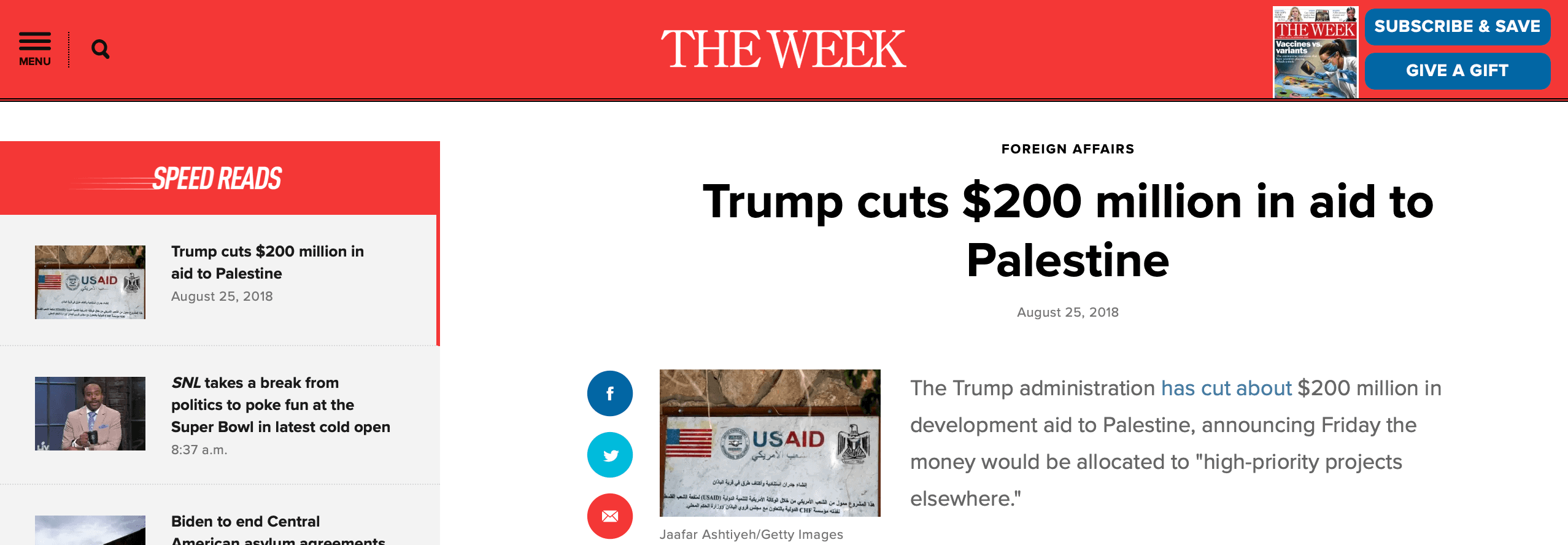For an online magazine that claims to provide readers with “all you need to know about everything that matters,” The Week fails to accurately report on the Arab-Israeli conflict and the Iranian nuclear threat. It even accepts and promotes the false claim that “Palestine” is a country.

The So-Called ‘State of Palestine’
The Week consistently refers to “Palestine,” even though a sovereign state by that name does not exist — and never existed. This practice results in odd sentences, like this one from a recent article on the normalization agreement between Israel and the United Arab Emirates:
“Historically, UAE law stated the recognition of Israel would only occur if Palestine became its own independent state, which has not happened.” [emphasis added]
The PA unilaterally declared statehood several times and seeks international recognition using the name “State of Palestine;” this, in defiance of the Oslo Accords with Israel. Moreover, the PA does not meet the criteria for statehood as defined by the so-called Montevideo Convention, and it is therefore not within the prerogative of journalists to decide what constitutes a country.
Join the fight for Israel’s fair coverage in the news
That The Week abides by the PA’s propaganda reveals its pro-Palestinian bias. This also becomes evident when examining the outlet’s reporting on the 2017 decision to relocate the US Embassy to Jerusalem and recognize the holy city as the Jewish state’s capital.
Contributors to the magazine called the move, which was grounded in US law (Jerusalem Embassy Act of 1995), “controversial,” a “pointless stunt,” and an “inflammatory idea.” It also suggested that the initiative by then-US president Donald Trump “disrupted discussions of peace.” The Week then proceeded to publish several provocative cartoons about the issue.
Related Reading: Deal With It: Jerusalem is Israel’s Capital
Perpetuating the Iranian Myth
The Week also distorts the facts on Iran. In its popular ‘Four decades of conflict with Iran, explained,’ the magazine misrepresents the chronology of events related to the Islamic Republic’s nuclear program:
“Amid heightened tensions, the U.S. Navy mistakenly shot down an Iranian passenger jet in the Persian Gulf in 1988, killing all 290 people on board. It was during this period that Iran decided to develop nuclear weapons.” [emphasis added]
The Week implies that Iran’s pursuit of a nuclear bomb was a response to the downing of Iran Air Flight 655 by the United States in 1988. The publication fails to mention allegations that the mullahs were already working on a clandestine nuclear weapons program four years before the crash.
In 1984, the authoritative Jane’s Defence Weekly claimed that West German companies were involved in building nuclear reactors for the Iranians, which are used to produce materials for an atomic bomb. The bombshell report claimed that Iran was only two years away from acquiring the weapon of mass destruction.
While disputing the “breakout time” reported by Jane’s Defence Weekly, the United States responded by urging a worldwide ban on the sale of nuclear materials to Tehran.
Meanwhile, the British weekly The Observer claimed that in 1987, a year before the Iran Air Flight 655 disaster, Iran signed a secret agreement with Pakistan on cooperation in the nuclear field, possibly with the goal of developing a bomb. In the years that followed, Iran dispatched engineers to Pakistani nuclear installations, where they received training.
By ignoring these reports and instead connecting Iran’s nuclear program to the aircraft’s downing, The Week is misleading its readers by perpetuating the myth that Iran merely responds to American actions.
However, The Week does not just leave out context when it comes to Iran’s nuclear program. On several occasions, the magazine refers to assassinated Quds Force commander Qasem Soleimani as a “general from Iran,” concealing his prominent role in the Islamic Republic’s global terror network. Indeed, many believe that Soleimani was the mastermind behind the 1994 bombing of the AMIA Jewish Center in Buenos Aires, Argentina, which killed 85 people and injured hundreds more.
‘Context and Clarity’?
The Week says its aim is to provide “context and clarity to complex issues.” But it apparently fails to uphold its own mission statement when it comes to reporting on the Middle East. In the case of Iran, the magazine leaves out crucial details and regarding the Arab-Israeli conflict, its contributors demonstrate a pro-Palestinian bent while oversimplifying the conflict.
Like HonestReporting describes in ‘The Eight Categories of Media Bias‘, omissions and lack of objectivity cloud the public discourse. Readers should demand that The Week upholds its self-styled standards.


